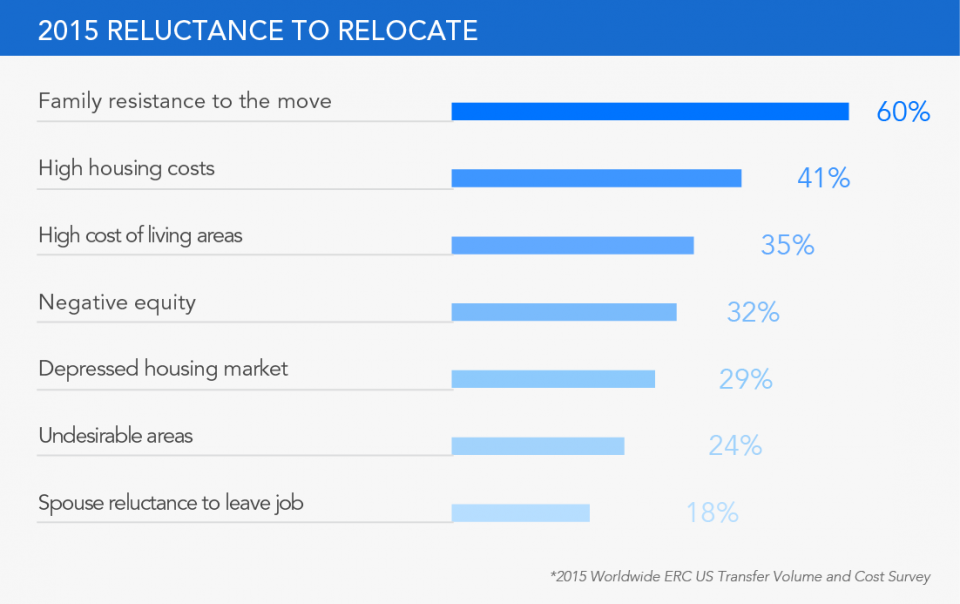Relocating employees often face serious concerns regarding their children’s education, family healthcare, eldercare, and the job market for their accompanying partner or fiancé. Understanding your employee’s needs and concerns can help them make the right decision with regard to relocating. While some candidates may appear perfect for a job opportunity on paper there may be a plethora of unseen obstacles that could result in a candidate declining an assignment, or worse, failing to relocate midway through their move.
Impact Stats:
In Worldwide ERC’s latest 2015 U.S. Transfer Volume and Cost Survey there are 3 statistics that will likely cause considerable stress to any human resources professional:
- The number 1 reason for an employee’s reluctance to relocate is family resistance to the move. (60% of all relocating employees!)
- The average cost to relocate a home owning employee comes in at around $72,000.
- Career concerns for the trailing spouse is a top 10 issue in addition to family resistance to the move.
That’s a lot of risk, and highlights the absolute necessity for comprehensive pre-decision planning and quality family support solutions. Understanding your employee’s concerns can help them make the right mobility decision. The right decision means better return on investment for your organization’s mobility program and a smoother transition for the employee and their family.[divider line_type=”No Line” custom_height=”20″]

Put a plan into place:
Organizational planning before the move is crucial to your program’s success. If you can’t remember the last time your organization revisited your relocation policy and process, it may be time for a quick dust off. Start with the family support essentials:
- Look into your career and family assistance offerings. Every organization and industry has its own idiosyncrasies. How do you determine how much assistance an employee needs? What level of support is too little? How much is too much? There are a lot of moving parts and given the amount of risk involved, reaching out to relocation management experts should be a part of any comprehensive plan.
- Provide a single point of contact. According to HRO Today’s 2015 provider report, a single point of contact is a hallmark of quality service at relocation management companies. A relocation manager or “coach” is the employee’s confidant and adviser if concerns arise before or during their relocation. Depending on the organization, policies can be complex and difficult for an employee to navigate. A relocation manager can help explain and coordinate career and family assistance benefits for the employee and their family. Without a single point of contact that understands the big picture some needs may inevitably fall through the cracks.
- Ensure your organization offers core services. Every relocation program should include a family pre-decision evaluation, career assistance, lifestyle and family support programs. Do your employees fully understand the impact the move will have on their partner’s career or their family’s lifestyle? Is a suburban family moving to a big city? What does the job market at destination look like for the employee’s spouse? Quality pre-decision screening and family support benefits help uncover underlying issues, and address them before they become problematic.
- Pre-decision screening should be proactive. The core elements of any pre-decision program includes: needs assessments to identify top concerns and potential red flags, general overview of the local job market and community, general information about companies that may fit the partner’s career goals, cost of living assessment and general salary information, and an in depth career assessment such as the Hiring Edge DISC.
- Be Better Than A Google Search. Some programs have website portals that simply list online resources for job searches. While sending an employee’s spouse to job boards like Career Builder or Jobing is a good start, but such services hardly offer anything more than a simple Google Search would. Comprehensive career assistance should review a candidate’s experience, identify personality type, discuss the importance of corporate culture, develop an application schedule and goals, offer resumé critique, provide networking and interview preparation and assist candidates in navigating the sea of job listings and online resources available today.
- Leverage your recruiting network. Possibly one of the best resources a company can offer up is their network of recruiters. Most organizations employ 3rd party recruiting companies to meet the demands of their own staffing needs. Providing a warm hand-off to these networks can make a world of difference. This is where some relocation management companies have an edge over in house relocation programs, as well as a key differentiator when comparing RMC’s.
- Support for the entrepreneur. Some spouses may have a small business and will have unique needs and guidance when relocating their business. Guidance and resources for spouses looking to start a new business or relocating an existing business may include market analysis, networking assistance, and introductions to the startup community in the new area.
- Understand the stressors of the relocating family. When employees and families relocate they undergo a massive amount of change. The biggest tasks such as finding living accommodations or working with moving companies, require a great deal of attention and leave little time to deal with other needs. This time crunch plus the stress that accompanies relocation can make it difficult for the employee and the family to adjust to the new location, emotionally and physically.
- Culture shock can happen anywhere. While traditionally thought of as an issue exclusively impacting employee on global assignment, domestic culture shock is a common occurrence. Any drastic change in lifestyle can have an unnerving effect such as: suburban life vs. inner city bustle, west coast laissez-faire style work environments vs. hard nosed New York hustle, even climate and geography play a significant role in a families ability to settle into a new location. Due to these factors, benefit packages should include services that assist the family after the move is completed. (These are sometimes called settling-in or acclimation services.)
- Get connected to the community. Moving to a new location often means employees and families must recreate their lifestyle without the help of the support network they traditionally relied on. An organization’s relocation program should fill in the gaps of a families support network during the transition with services that identify relevant community networks, activities, medical specialists, secondary and higher educational resources as well as licensed preschools and/or day cares.
While there are a lot of moving parts and face value costs to providing a comprehensive family support plan, the benefits pay dividends. With over 60% of employees confirming that family issues presented major challenges to their relocation, family support services deserve healthy attention. Given a price tag of 72,000 per relocation, organizations can’t likely afford policy missteps. While this article provides a quality overview of the topic, organizational needs are unique and may depend on program type, industry, company size, and geographic location. If you have questions on how your program’s family support benefits measure up, reach out to a family support consultant at Global Mobility Solutions today for a free comprehensive program review.
Sam Hoey | CRP, GMS
Senior Vice President, Global Account Management Sam joined Global Mobility Solutions in 1996 and has a unique perspective with her 25 years of industry experience. Samantha offers her clients relocation expertise and a commitment to excellence in her. Her proficiency in orchestrating the BVO and GPO Programs, as well as relocation policy design and implementation, are invaluable assets to the accounts she manages. Her experience in administering Pre-Decision Relocation services to enhance the recruiting process further demonstrates her unique abilities to service her clients. Samantha’s diverse experience, leadership, and outstanding communication skills enable her to manage the relocation process for her clients with finesse and polished professionalism.



